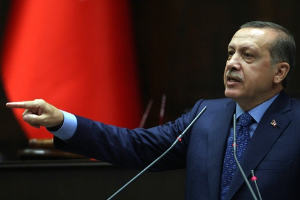Will Clinging to the EU and Atatürk Save the AKP?
By the Editors (vol. 1, no. 5 of the Turkey Analyst)
Just as it has been faced with the threat of dissolution, the AKP’s faith in Europe has been rekindled. More remarkably, the party is even clinging to the Atatürk legacy in an unprecedented way. The AKP’s change of heart is testimony to the party’s distress. Although displays of “kemalism”, in particular, are confusing, the new rhetoric has not convinced analysts that the party’s ideological orientation has been altered.
What Animates Turkey's Secular Opposition?
By the Editors (vol. 1, no. 4 of the Turkey Analyst)
As the confrontation in Turkey over secularism deepens, the psychology and dynamics of the secular opposition need to be better understood. The seculars are animated by the perceived need to defend an identity, which lends the stand-off an intractable character. Democracy risks being imperiled if the moderate Islamist AKP government abstains from taking decisive steps to allay what amounts to existential fears – be they exaggerated or not – of the seculars.
Erdogan's Towering Role in the AKP
By the Editors (vol. 1, no. 2 of the Turkey Analyst)
Turkey’s Justice and Development Party (AKP) dominates the country’s political landscape, but few Western analysts have looked closer at the evolution of its leadership structures. A closer analysis nevertheless shows that it has changed significantly, from a collegial leadership team to ever-growing power being transferred to Prime Minister Tayyip Erdogan’s personality. At present, Erdogan appears to rule the party in a rather authoritarian fashion, discouraging advice outside the inner circle and the exchange of opinions.
Will Erdogan Always Prevail?
By Halil Karaveli (vol. 7, no. 10 of the Turkey Analyst)
The year after the Gezi Park protests has been the most difficult for Recep Tayyip Erdoğan since he became prime minister, but he has prevailed over his foes and challengers and he can confidently look forward to becoming Turkey’s first popularly elected president in the upcoming election in August. No one can challenge Erdoğan. However, that does not mean that Turkey is always going to bend to his will or that the country is going to be easy to govern even for an all-powerful President Erdoğan.

What the Columnists Say
The explosion at the Soma coal mine that claimed the lives of three hundred workers has led some to critical comments against the neo-liberal economic regime in Turkey. Hasan Cemal, a liberal commentator, argues that it’s time to revisit long-forgotten notions like social justice and he questions the wisdom of totally expelling the state from the economy. The rising tensions in Turkish society are of great concern for many commentators. Oral Çalışlar, a liberal, warns that Turkey is drifting toward chaos. And although he does not hold Prime Minister Recep Tayyip Erdoğan solely responsible for this dangerous drift, he nonetheless argues that Erdoğan’s reactions exacerbate the polarization and he urges him to take steps that ease the tensions. Yüksel Taşkın, a social democratic academic and columnist, accuses the AKP government of having intentionally alienated the Alevis and he warns that especially the Alevi youth has become a powder keg that is ready to blow up.




